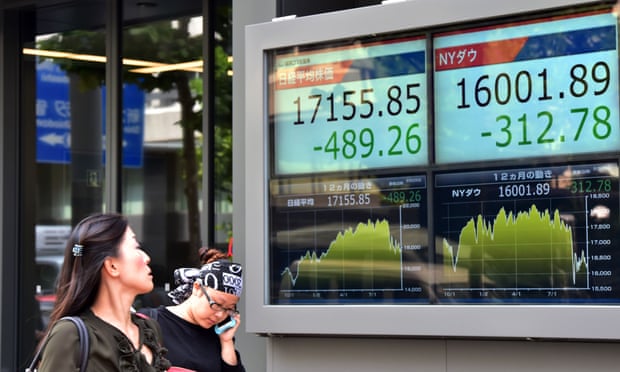Asian markets fall as fears deepen over China slowdown
Wall Street losses drag down Tokyo and Shanghai indexes with Asia-Pacific markets at lowest level since June 2012
Deepening concern over the health of the Chinese economy has again struck Asian markets, with shares in the region plummeting to their lowest level for three-and-a-half years, after weak Chinese data prompted sharp losses on Wall Street.
The Nikkei 225 ended Tuesday down 714.27 points, or 4.05%, from Monday at 16,930.84 – its lowest level for about eight months.
MSCI’s broader index of Asia-Pacific shares outside Japan slumped 2.3%, touching its lowest levels since June 2012 and extending early declines after Chinese shares opened lower.
China’s blue-chip CSI 300 index and the Shanghai Composite Index were down 2% and 1.9%, respectively.
European markets also opened lower, with the FTSE 100 falling by around 80 points, or 1.4% in early trading, although it was later trading at 5,909, down around 49 points, or 0.8%.
“Investors are worried about a sharp slowdown in China ... but the biggest risk is a global recession, not just a China issue,” said Steven Leung, a director at UOB Kay Hian in Hong Kong.
“If you look at Japan ... its economy is in bad shape. And the economic situation is not good in Europe, either.”
Asian markets were feeling the fallout from China, where a survey of industrial firms published on Monday showed an 8.8% year-on-year decline in profits in August.
“It’s a statistic that usually doesn’t affect stock markets, but due to the breadth of the fall, the outlook on China’s slowdown and its likely global effects has darkened significantly,” Chihiro Ota, general manager of investment research at SMBC Nikko Securities, told Kyodo News.
The yen, considered a safe haven by investors in times of market tumult, strengthened against the dollar, with the US currency trading in the 119-yen range on Tuesday morning.
Recent surges by the yen have caused alarm in Tokyo, since a stronger yen hits profits made overseas by Japanese manufacturers, the driving force of the world’s third-biggest economy.
On Wednesday, all eyes will be on Japan’s Tankan report – an important indicator of how much confidence companies have in the prospects for economic recovery.
For now, global concern is centered on China, where industrial companies’ profits fell at their fastest rate in four years, official data showed on Monday.
“There is a lot of red in Asian equity markets at the moment,” said Martin King, co-managing director at Tyton Capital Advisors. “Disappointing industrial profits in China continue to bolster concerns about growth and many investors are taking profits from the Nikkei and sitting in cash and alternatives, or repatriating capital to western markets in a perceived flight to quality.”
Shipping and steel companies were among the hardest hit on Tuesday, as they are more vulnerable to drops in demand from China, the world’s second-biggest economy.
Japan’s Topix iron and steel subindex lost 5.2%, with Kobe Steel slumping 11.1% after it cut its earnings outlook.
“The steel sector has been heavily impacted by China’s slowdown because more than 50% of the demand is there,” said Takashi Enomoto, an analyst at the Bank of America Merrill Lynch. “But Japanese steel companies will be hurt a little less than others by the shrinking demand because of the domestic demand from automotive players.”
The week had already got off to a rocky start, with all major indices on Wall Street closing sharply down on Monday.
The S&P 500 index hit a one-month low on bullish US consumer spending data in August as it raised concerns the Federal Reserve could hike rates at a time of slackening global growth.
Although the Fed decided not to raise interest rates at its meeting earlier this month - citing concern over China – speculation is building that the central bank could approve a rate hike as early as next month.
In a note to clients on Tuesday, Sean Callow, senior currency strategist at Westpac in Sydney, said: “Markets have heard such talk before and with equities under pressure, it was hard to take rate hike talk seriously.”






No comments:
Post a Comment
Please leave a comment-- or suggestions, particularly of topics and places you'd like to see covered